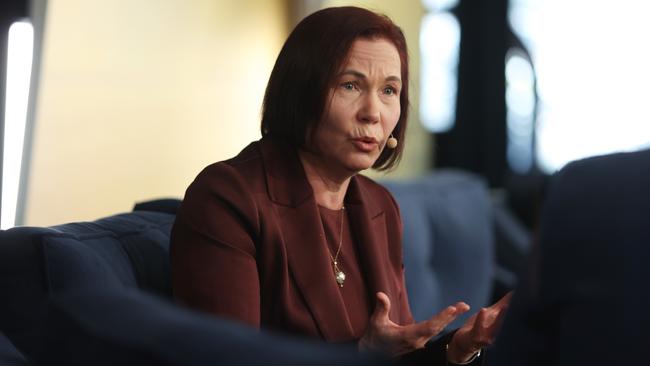Big business cool on Peter Dutton’s nuclear push
Business leaders have criticised the Coalition’s rollout of an uncosted plan to develop a major nuclear industry, airing significant potential hurdles to the power station plan.
Business leaders have criticised the Coalition’s rollout of an uncosted plan to develop a major nuclear industry, airing concerns that price, construction complexity and community opposition will prove significant hurdles to the power station plan.
Speaking at The Australian’s Energy Nation forum on Wednesday, business bosses were cautious on lending support to Peter Dutton’s scheme for seven potential nuclear sites mostly located on the sites of coal power stations.
Origin Energy chief executive Frank Calabria said the industry was agnostic to technologies underpinning the country’s electricity market, but said nuclear had sizeable hurdles, and it did not offer an immediate solution.
“There’s obviously also the public debate that’s going to go on about the acceptance of nuclear, and we would have to watch that as well. We’re not in control of that,” Mr Calabria told the forum.
“The experience today around the world if you’re building a new one, it’s very expensive, but there are now new modular technology around the technologies that are certainly development and research, and that’s going to be something that continues, and we all look at that with interest.”
The Opposition Leader has flagged a raft of potential sites, including the Liddell power station in NSW and Victoria’s Loy Yang, both owned by AGL Energy, and EnergyAustralia’s Mount Piper Power Station in NSW.
Energy Minister Chris Bowen told the Energy Nation conference that six of the owners of those sites had said “those sites are not available for nuclear”.
AGL Energy signalled its strong opposition to the nuclear rollout proposal, repeating a prior warning that it first issued in March to the Coalition’s policy.
“AGL is already developing our coal and gas power station sites into low-emissions industrial energy hubs,” AGL chief executive Damien Nicks said. “As the owner of these sites, nuclear energy is not a part of these plans. There is no viable schedule for the regulation or development of nuclear energy in Australia, and the cost, build time and public opinion are all prohibitive.
“AGL is strongly focused on ensuring strong social licence with the communities and traditional owner groups where we operate and there remain significant unanswered questions about the cost and plans for radioactive waste.”
The power operator also noted the importance of policy certainty and said ongoing debate on the matter “runs the risk of unnecessarily complicating the long-term investment decisions” necessary for the energy transition.
EnergyAustralia said it was technology neutral as to what would be required when asked about the push, but stated it had not opened any talks over using its sites for nuclear.
“Nuclear is recognised internationally as a zero carbon energy generation technology, one that needs a good regulatory framework and a well-developed industry to deliver support it,” an EnergyAustralia spokesman said.
“We regularly talk energy with governments, politicians and regulators about how to deliver the best possible energy outcomes for customers through the transition. To date, we have not discussed the use of any EnergyAustralia sites in the context of nuclear.”
Shell Australia chair Cecile Wake said there was merit in a conversation around nuclear, while noting the energy giant would not consider tapping the technology itself.
“We need to stop demonising gas, we need to look more broadly than simply the … renewable penetration in the electricity mix, we need to look to biofuels,” Ms Wake told the forum. “We need to at least have a conversation around nuclear,” she added, noting Shell did not operate in the nuclear sector as it didn’t have a competitive strength.

The owner of the Vales Point coal plant in NSW’s Hunter Valley, Delta Group, said the Coalition’s energy announcement was “interesting” and a “challenge”.
“My power station was commissioned in 1978,” Delta Group CEO Richard Wrightson told the forum. “Well over 40 years old, we’re still fixing parts that are actually original.
“So the real question on the nuclear debate is, is it the right path? How quickly can you do it? I mean, you can’t deliver it quickly. You still have to build stuff. You can’t get away from having to build stuff just because you’re going to build nuclear in 15 or 20 years’ time. We need to build stuff now.”
Minerals Council of Australia chief executive Tania Constable stressed the need for a “technology agnostic approach” when asked about the Coalition’s nuclear plan.
“If we’re going to get the cheapest, most reliable, cleanest energy out to 2050, our position is net zero by 2050. That’s not contested by either party,” Ms Constable said.
“We’ve had this argument going on about what is the cheapest form of energy, but they’ve all got different characteristics, for nuclear, for coal, for gas, it’s that 24/7 ability.
“So it’s a whole-of-system approach, because you’ve got less transmission and distribution that is needed because we’ve already got the infrastructure in place.”






To join the conversation, please log in. Don't have an account? Register
Join the conversation, you are commenting as Logout